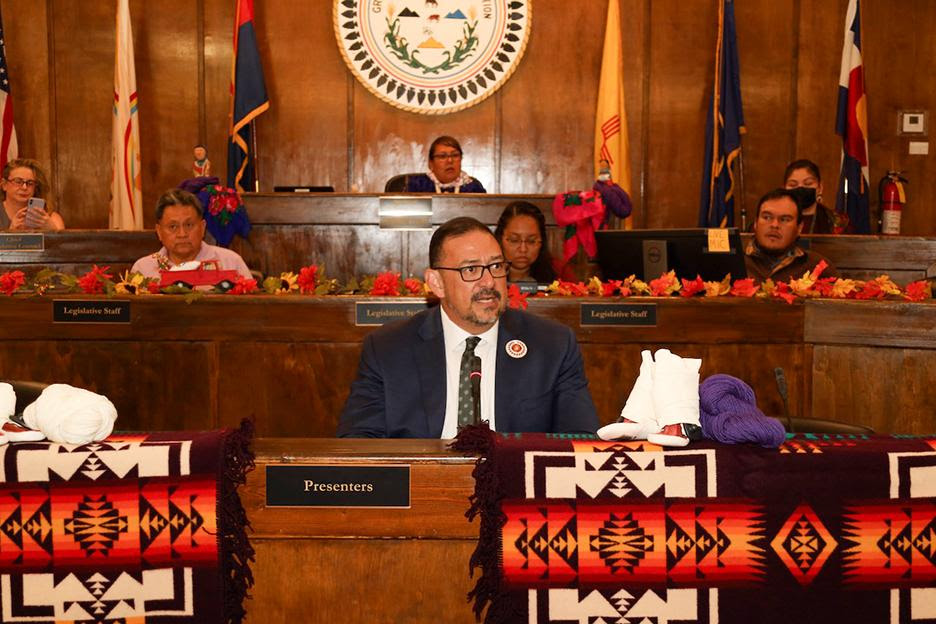
- Details
- By Native News Online Staff
On the opening day of the Navajo Nation’s 2023 Fall Council session, Arizona Secretary of State, Adrian Fontes, emphasized his responsibilities as the Chief Election Officer of the state. His role primarily involves providing oversight and guidance to ensure safe and accurate elections.
Fontes said he takes his role as chief election officer, as Arizona’s secretary of state, he will facilitate discussions and consultations with tribal nations, the counties, and the federal government to protect the rights of voters. To help protect the integrity of elections, the Arizona Secretary of State’s Office publishes an election procedure manual to ensure consistent and efficient election administration across the state
“Madame Speaker has put forth recommendations to the manual and the state adopted them,” Fontes said. “The changes were made and forwarded to [Arizona] Governor Katie Hobbs.”
Fontes announced that the Secretary’s Office has implemented an Online Voter Registration Unique URL Program to encourage organizations conducting large-scale voter registration drives to do so electronically and securely through the ServiceArizona website, rather than relying exclusively on paper forms.
Fontes said that groups and organizations can use this program to register voters using computers and tablets, which will speed up voter registration. Additionally, he is advocating to increase voting centers in the state.
In pursuit of more efficient voter registration methods, the Secretary's Office has introduced the Online Voter Registration Unique URL Program. This program encourages organizations conducting large-scale voter registration drives to use the ServiceArizona website for secure electronic registration, reducing reliance on paper forms. Fontes emphasized that groups and organizations can use computers and tablets to speed up the voter registration process. He also advocated for an increase in voting centers across the state.
"In Phoenix, there is a remote voter registration terminal at Native Health, allowing tribal members to register with an organization they trust," he said. "I advocate for the placement and expansion of vote centers across Arizona, especially for rural voters who need correct and tabulated ballots."
Fontes also highlighted his office's efforts to address communication challenges and work with counties to ensure the accuracy of chapter and precinct boundaries while being sensitive to the unique challenges faced by Native voters.
His report included the introduction of a workforce fellowship program, in which the State Secretary's Office provides funding to counties to recruit students from community colleges and universities. These students assist county election departments on the ground, ensuring smooth election operations.
Fontes emphasized that programs like this will help prevent issues such as what occurred in Many Farms last year. "What happened in Many Farms was unacceptable and should not have occurred. The polling place should not have opened late."
In his closing statement, Fontes reiterated his dedication to collaborating with tribal nations and organizations. "It's an honor to address this Council today. It is my duty to ensure that every American's constitutional rights are preserved, and that the integrity of the voting process is protected."
“In Phoenix, there is a remote voter registration terminal at Native Health, so tribal members can go to an organization they trust to register to vote,” he said. “I advocate for vote centers to be placed and expanded across Arizona. We need help geocoding for rural voters because we need every ballot to be correct and tabulated.”
Fontes said his office is addressing communication challenges, while also working with the counties to enforce chapter and precinct boundaries for accuracy, and to make them aware of the challenges that face Native voters.
His update included the implementation of a workforce fellowship program, in which the State Secretary’s Office provides funding to counties to recruit students from community colleges and universities to help county election departments assist with elections by providing on the ground staffing.
In his closing statement, Fontes reinforced his dedication to working with tribal nations and organizations.
“It’s an honor to be before this Council today,” he said. “It’s my duty to ensure that every American has their constitutional rights preserved and that voting is protected.”
More Stories Like This
Native News Weekly (August 25, 2024): D.C. BriefsUS Presidents in Their Own Words Concerning American Indians
Next on Native Bidaské: Covering Indian Country: Lessons from 2025 & the Road Ahead
The Stories That Started to Define Cultivating Culture in 2025
The National Congress of American Indians (NCAI) Mourns the Passing of Former U.S. Senator Ben Nighthorse Campbell (Northern Cheyenne)
Help us defend tribal sovereignty.
At Native News Online, our mission is rooted in telling the stories that strengthen sovereignty and uplift Indigenous voices — not just at year’s end, but every single day.
Because of your generosity last year, we were able to keep our reporters on the ground in tribal communities, at national gatherings and in the halls of Congress — covering the issues that matter most to Indian Country: sovereignty, culture, education, health and economic opportunity.
That support sustained us through a tough year in 2025. Now, as we look to the year ahead, we need your help right now to ensure warrior journalism remains strong — reporting that defends tribal sovereignty, amplifies Native truth, and holds power accountable.
 The stakes couldn't be higher. Your support keeps Native voices heard, Native stories told and Native sovereignty defended.
The stakes couldn't be higher. Your support keeps Native voices heard, Native stories told and Native sovereignty defended.
Stand with Warrior Journalism today.
Levi Rickert (Potawatomi), Editor & Publisher


